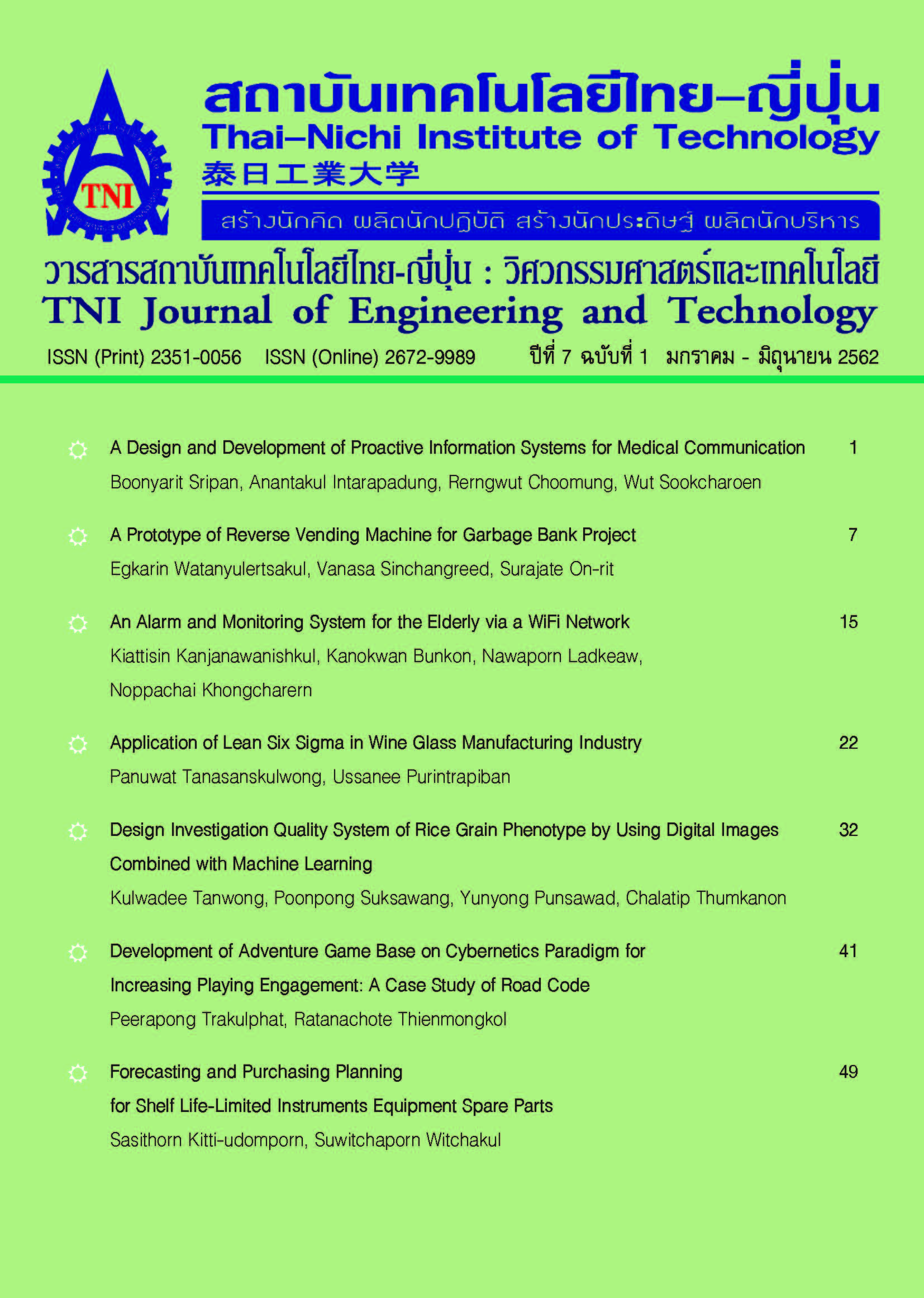A Prototype of Reverse Vending Machine for Garbage Bank Project
Main Article Content
Abstract
In the present, plastic bottles and aluminum cans are used in packaging consumption volume increasing. If there are no appropriate separation process could become a solid waste pollution that affects the environment very seriously. How to reduce air pollution from the waste, such as reuse, or applied repeatedly called recycling, so as to modify the value of the waste, and can increase revenue. The research team therefore found ways to solve the problem by studying and collecting information to develop the reverse vending machine for garbage bank projects for support activities and raise awareness of good people in the community to help prevent the waste problem that destroyed the environment.
The results of the research showed that the reverse vending machine for garbage bank project. Provides the ability to separate the types of cans, small, medium, large, steel cans and plastic bottles. Separation by taking the average overall was 99.60 percent thought efficiency in compression can reduce the size of packaging, all types, representing 54.33 percent average.
Article Details
Article Accepting Policy
The editorial board of Thai-Nichi Institute of Technology is pleased to receive articles from lecturers and experts in the fields of engineering and technology written in Thai or English. The academic work submitted for publication must not be published in any other publication before and must not be under consideration of other journal submissions. Therefore, those interested in participating in the dissemination of work and knowledge can submit their article to the editorial board for further submission to the screening committee to consider publishing in the journal. The articles that can be published include solely research articles. Interested persons can prepare their articles by reviewing recommendations for article authors.
Copyright infringement is solely the responsibility of the author(s) of the article. Articles that have been published must be screened and reviewed for quality from qualified experts approved by the editorial board.
The text that appears within each article published in this research journal is a personal opinion of each author, nothing related to Thai-Nichi Institute of Technology, and other faculty members in the institution in any way. Responsibilities and accuracy for the content of each article are owned by each author. If there is any mistake, each author will be responsible for his/her own article(s).
The editorial board reserves the right not to bring any content, views or comments of articles in the Journal of Thai-Nichi Institute of Technology to publish before receiving permission from the authorized author(s) in writing. The published work is the copyright of the Journal of Thai-Nichi Institute of Technology.
References
K. Rujiwichit, Research recycling rate to study the development of sustainable and appropriate waste management system for Thailand Phase 1. Bangkok: Thammasat University, 2014.
P. Chanthuma, “Success Factors in the Recycling Bank of Kham Ngnang Ruay in Kham Nam Saep Sub-district, Warinchamrap District, Ubon Ratchathani Province,” Area Based Development Research Journal, Vol. 6, No. 5, pp. 94-105, 2014.
Office of the National Economic and Social Development Board, The national development strategy according to the 12th National Economic and Social Development Plan. Bangkok: Office of the National Economic and Social Development, 2016.
R. Tomari, A. A. Kadir, W. N. W. Zakaria, M. F. Zakaria, M. H. A. Wahab, and M. H. Jabbar, “Development of Reverse Vending Machine (RVM) Framework for Implementation to a Standard Recycle Bin,” Procedia Computer Science, vol. 105, pp. 75–80, Jan. 2017.
D. Maunkhaw., et al., “Extrusion Process of Plasiic Wate for Pplastic Recycling,” presented at the Academic conference Sustainable Rural Development 2012 Local Community Foundations for the development of the ASEAN Economic Community”, Khon Kaen University, Khonkaen, 2012, p 391-396.
Refun Corporate. “Refun Machine.” [Online]. Available: https://refun.com/ refun-machine. [Accessed: 12-Oct-2017].
J. F. Hall. and D. Chen, “Dynamic Optimization of Drivetrain Gear Ratio to Maximize Wind Turbine Power Generation—Part 1: System Model and Control Framework,” Journal of dynamic systems, measurement, and control, Vol. 135 No. 1, 2013.


